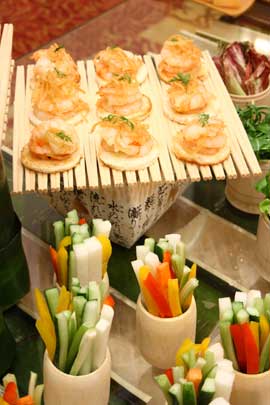Pictures
Meeting in the green
By Karyn Piechule (China Daily)
Updated: 2010-08-14 15:17
 |
Large Medium Small |
 |
|
Seasonal delicacies are made from locally purchased ingredients. [Photo/Provided to China Daily] |
Named the Carbonless Meeting Program, the China World Hotel offers companies the option to set up business meetings in the hotel, which uses eco-friendly amenities, such as seasonal lunches served with ingredients purchased from local vendors, whiteboards to diminish the use of paper products and the option of renting a hybrid car for attendees' transportation.
"Many hotels offer standard green packages," says John Rice, general manager of China World Hotel. "We've named ours carbonless because it emphasizes less emission and fewer meeting footprints. It's a program more than a package, with many different dimensions involved."
The luxury hotel, located in the central business district, recently announced the availability of the program, which will cost 650 yuan ($95.8) per person and is comparable to the cost of a traditional meeting package.
"Cost considerations come first, but I would encourage all hotels in Beijing to become more eco-friendly," says Alan Babington-Smith, director of Leadership Management International in China.
Greener options within the hotel's program include cutting back on paper products and encouraging attendees to use their laptops. The hotel provides computer adapters for all attendees along with wireless Internet access and the use of PowerPoint.
While many changes have taken place within technology, the hotel has overhauled their food menu, modifying traditional food and coffee breaks. Fair trade vendors and onsite chefs are used in order to cut back on excessive gasoline otherwise used to transport ingredients.
Another creative quality of the meeting program is that the hotel has cut out the use of mints and plastic water bottles, a typical presence at meetings, and has instead opted to use a water pitcher infused with mint leaves to serve to attendees.
"This kills two birds with one stone," Suemeng Chan, China World Hotel director of communications, says. "Attendees are provided with water and can refresh their breath the same way."
One of the more luxurious features now available is the use of the Mercedes S400 hybrid series that can transport meeting organizers and attendees around Beijing and to the airport.
The hotel's mission to cut carbon emissions also includes rewarding meeting organizers with a certificate of appreciation and handing out green-living guidebooks, so meeting attendees can further their eco-friendly educations.
Since 2000, the hotel has enlisted in green efforts and over the past five years alone has achieved an 18-percent decrease in CO2 emissions.
The hotel estimates that over a typical three-day 30-person business meeting, the new green standards can decrease Co2 emissions by 1,000 kilograms - an amount that would traditionally take 60 trees to absorb.
The hotel plans to allocate 2 percent of its revenue from every carbonless meeting into a green fund to help community beneficiaries, such as the Hua Ao School in Shijinshan district.
While plans are still being worked out, the school, which educates about 900 migrant children, would receive the hotel's funding to further self-sustainability programs and education.
One idea includes growing an herb garden the students would take care of and then sell back to the community or hotel for profit. A second plan would include developing an education module to teach children at the school about environmental protection and, more specifically, ways to help preserve the earth.



